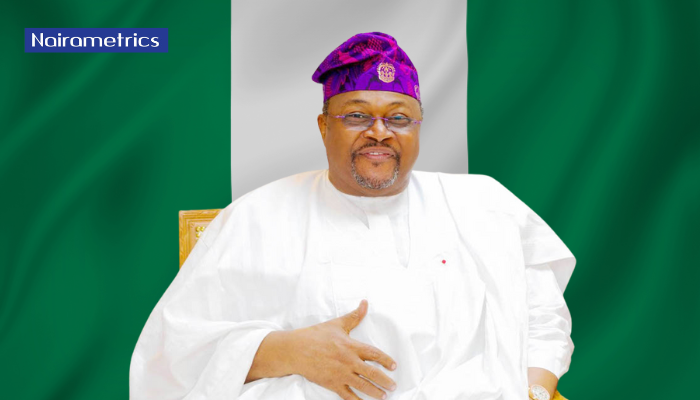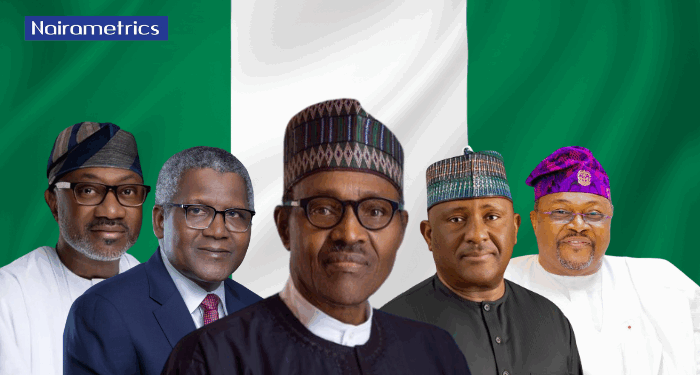The passing of former Nigerian President Muhammadu Buhari sparked a wave of reflection across the nation.
As citizens weigh the impact of his eight-year administration (2015–2023), opinions vary widely on the economic legacy he left behind.
While many reports have chronicled the economic turbulence of two recessions, inflation spikes, and a volatile naira that defined much of the Buhari era, it is also important to examine how Nigeria’s wealthiest individuals navigated these stormy waters.
Despite widespread economic hardship, some billionaires not only stayed afloat but expanded their empires, while others faced setbacks due to shifting policies, regulatory crackdowns, and an uncertain investment climate.
In this piece, Nairametrics explores how Nigeria’s top billionaires (in dollar terms)performed during the Buhari administration. We examine their net worth trajectories, business growth (or decline), the industries they dominate, and how key government policies affected their standing in the country’s socio-economic landscape.

Net Worth Before Buhari: $10 billion
Net Worth After Buhari: $6.1 billion
Over eight years of economic volatility and policy experimentation, Adenuga kept a low profile, yet his business footprint deepened and consolidated across sectors central to Nigeria’s economic survival, telecommunications and petroleum.
Though less visible in public forums than his peers, Adenuga’s empire weathered the economic headwinds of Buhari’s presidency.
Performance
Under Buhari’s tenure, Glo grew into Nigeria’s second-largest mobile network provider by subscriber base, trailing only MTN. Despite intense competition, the company held on to over 55 million subscribers by 2023, supported by aggressive pricing strategies, expansive data infrastructure, and strong rural network penetration.
- The Buhari administration’s push for a digital economy, led by the Ministry of Communications and the National Digital Economy Policy launched in 2020, played to Adenuga’s advantage. With surging demand for internet services during the pandemic and a young, mobile-first population, Globacom saw record increases in data consumption, especially in Nigeria’s underserved areas.
Glo’s submarine cable system, Glo-1, one of the first privately owned trans-Atlantic cables in West Africa, became even more critical to regional connectivity, positioning Adenuga as a key enabler of Nigeria’s digital backbone.
- In 2021, Conoil Plc reported double-digit profit growth, boosted by rising crude prices and cost efficiencies, a rare bright spot in Nigeria’s downstream oil sector at the time.
Net worth fluctuations
- 2016: His net worth peaked at $10 billion, making him the second-richest man in Africa at the time.
- 2018: It plunged to $5.3 billion, driven by naira devaluation and oil sector instability.
- 2019: Rebounded to $9.2 billion as oil prices rose and Glo’s market share improved.
- 2020: Fell again to $5.6 billion amid COVID-19 disruptions and renewed naira pressure.
- 2022: Rose to $7.3 billion, reflecting improved oil revenues and renewed investor confidence in the digital economy.
- 2023: It dropped again to $6.1 billion at the end of the year.
Final analysis: Net loser














Using exchange rates N200/ dollar in 2015 and N 465/ dollar in 2023, the billionaires lost in dollar terms, but gained in Naira terms.
But the stock market gained both in Naira terms.
This means “poorer” billionaires and richer rest of the investors.
This implies better wealth spread, and probably an expansion of the wealth class and maybe the middle class.
This probably explains why aviation flights and vehicle registrations hit an all time high by 2022.
More people could afford this
Note: Buhari is dead. Let’s reduce the biases now and try and keep the analysis honest and facts based. No more political, ethnic or religious scores to gain.
Did you notice that the business that has made Dangote double his wealth in 2024 was built between 2017 and 2023? Under Buhari? With immense FG support in cash, policies etc?
That’s a true wealth building legacy